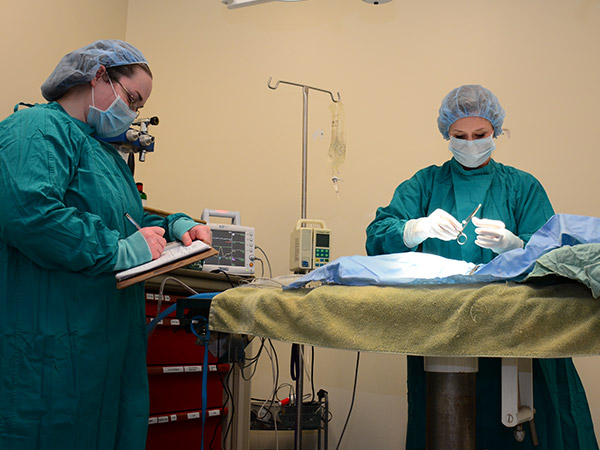Routine Surgery at Jefferson Animal Hospitals
Jefferson Animal Hospitals is fully equipped to provide routine surgical care for your pet. Some of the routine procedures that are performed here daily include spaying, neutering, and dental prophy (cleaning) procedures. The information that follows will outline everything necessary for understanding our surgical procedures. If you are interested in having your pet’s routine surgery at one of our two locations, please contact us to schedule a consultation with one of our veterinarians.
Any pet coming into the hospital for surgery needs a thorough physical examination, in your presence. Any problems found during the exam which could cause problems during the operation are thoroughly discussed with you at that time. Our staff veterinarians require a pre-surgical blood screening prior to any surgery. We would never place an animal under anesthetic without screening to rule out any underlying problems which could cause complications during surgery.
All routine surgical procedures are performed with the pet placed under full general anesthesia. Your pet sleeps painlessly through the entire operation. At Jefferson Animal Hospitals, the specific type of anesthetic used is tailored to the specific health picture and physical condition of your pet in order to make the surgery as safe as possible. Among the anesthetics available at our hospital is Isoflurane, one of the most modern gas anesthetics available today. For each individual patient, we use a pack of surgical instruments which has been freshly sterilized by pressure (autoclave) sterilization. This is vitally important to preventing serious infections. The surgery is performed in our private operating room – a room used only for surgical procedures. The surgery is performed by one of our licensed veterinarians – sterile, scrubbed and gloved for each individual patient.
After surgery, each patient is carefully monitored by our veterinarians, trained staff members and medical technicians until he or she is fully awake and stable. No pet is dismissed from the hospital until we are satisfied that he or she is fully recovered from the anesthetic and stable from the surgery.
The Pre-Surgical Examination
It is very important that you meet with one of our veterinarians to discuss the individual health status of your pet. The services that we recommend for your pet are largely based on their age and their physical condition. For example, a 4 month old healthy puppy, ready to be spayed, will have much different pre-surgical needs than a 14 year old cat that has periodontal disease and needs a dental prophy (cleaning). During this examination our veterinarian will evaluate your pet’s vaccination history, risk factors and general health condition. There are also some optional services that you may want to take advantage of that are offered for pets that are having surgical procedures. If you are planning to have your pet evaluated for surgery here at Jefferson Animal Hospitals, it will help you to be familiar with what is offered leading you to ask any questions that you might have with the doctor during the pre-surgical examination.
Anesthesia advanced monitors including EKG, Pulse Oximetry, respiratory monitors and blood pressure monitors are used during all anesthetic procedures to ensure the safest possible outcome.
The Procedures
Spay
Spaying is a surgical procedure recommended for all female dogs or cats over four months of age. This is considered a major surgery because it is an abdominal procedure. During this operation, both the ovaries and the uterus are removed. Removal of the ovaries means that the hormonal influence which causes the behavior known as “being in heat” is gone. Your pet will no longer come into heat, or be able to produce puppies or kittens.
In most situations a pet that is spayed will go home without skin sutures. We typically use sutures that are buried below the skin. This has proven to be very effective, because it reduces the risk of your pet having a skin reaction to the suture material. Using these sutures also means that you don’t have to bring your pet back for suture removal 10 – 14 days after the surgical procedure.
Neuter
Neutering is a surgical procedure recommended for all male dogs or cats over four months of age. This surgical procedure will remove the testicles rendering the pet sterile and unable to produce sperm. Be aware that although your pet will not be able to father puppies or kittens, he may still become aroused in the presence of a female in heat and may still be able to perform intercourse.
There will be a small incision made at the base of the penis or over the scrotum to perform the procedure. Here at Jefferson Animal Hospitals, we perform this incision with our surgical laser. This helps minimize post operative discomfort and bleeding. Once the procedure is performed, we typically use sutures that are buried below the skin to close the incision. This has proven to be very effective because it reduces the risk of your pet having a skin reaction to the suture material. Using these sutures also means that you don’t have to bring your pet back for suture removal 10 – 14 days after the surgical procedure.
Elizabethan Collar
Remember that one very important thing to watch for is your pet licking or biting at the incision site. If this happens and you cannot stop it with distraction, then you might need to come in and pick up an Elizabethan Collar. This is a product that resembles a lamp shade that is placed around your pet’s neck to keep them away from the incision. These are not routinely sent home at the time of the procedure unless you feel that your pet is at a high risk for biting and licking at the incision.
Discharge
When your pet is discharged, you will be given oral and written instructions explaining what to do and what to look for during your pet’s recovery period.

